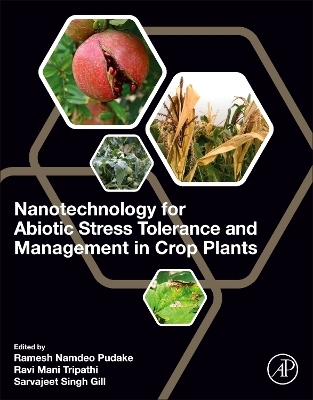
Nanotechnology for Abiotic Stress Tolerance and Management in Crop Plants
Academic Press Inc (Verlag)
978-0-443-18500-7 (ISBN)
Dr Ramesh Namdeo Pudake is an Assistant Professor in Amity University Uttar Pradesh, India. Dr Pudake received his PhD from China Agricultural University, Beijing, China, and after his PhD he engaged in research in a range of topics in biotechnology. He has also worked in the Department of Agronomy at Iowa State University Ames, IA, USA on functional genomics. Currently he is focusing on the research of different nanotechnology applications in agriculture. Dr Pudake has published several book chapters and articles in prominent Journals. Dr Ravi Mani Tripathi is an Associate Professor at Amity Institute of Nanotechnology, Amity University Uttar Pradesh, Noida, India. He received his Ph.D. in Nanobiotechnology from Jiwaji University, Gwalior, India. He did his post-doctoral research at School of Pharmacy, Sungkyunkwan University, South Korea, and received the young scientist award in 2019 from the International Scientist award on Engineering, Science, and Medicine, Visakhapatnam, India. He has 15 years of teaching and research experience in Nanobiotechnology. He developed an innovative method for the biological synthesis of nanomaterials like particles, nanodots, flowers, rods, fibres, etc. and has vast expertise in the fields of antimicrobial nanomedicine, colorimetric detection, and catalytic/photocatalytic degradation of toxic pollutants. Dr. Sarvajeet Singh Gill is an Assistant Professor at Centre for Biotechnology, Maharshi Dayanand University, Rohtak. His research focus includes Agricultural Plant Biotechnology; Biotic & Abiotic stress biology, plant microbe interaction and in-silico understanding of plant genomes. In addition to his research and teaching responsibilities he has served as Associate Editor for the Brazilian Journal of Botany, and as Guest Editor of Plant Genes. He was Guest Editor of BioMed Research International’s Special Issue (Plant Stress & Biotechnology); Frontiers in Plant Science, Section-Environmental Toxicology (Topic Title: Phytotoxicity of high and low levels of plant-beneficial heavy metal ions); Frontiers in Plant Science, Section-Crop Science and Horticulture (Topic Title: The Brassicaceae - agri-horticultural and environmental perspectives); Frontiers in Plant Science, Section-Plant Physiology (Topic Title: Recent insights into the double role of hydrogen peroxide in plants); and Functional Genomics Approaches to Decipher Plant Resilience to Environmental Stresses (International Journal of Plant Genomics).
1. Status of impact of abiotic stress on global agriculture 2. Molecular mechanism of abiotic stress regulation in crop plants 3. Introduction to fundamentals of nanoparticle synthesis, characterization, and properties 4. Role of nanotechnology in crop management 5. Molecular mechanism of nanomaterial interaction with plants 6. Role of nanoparticles to protect plant from abiotic stress by scavenging reactive oxygen species 7. Recent advances in field of plant nano nutrition 8. Nanosensors for monitoring soil parameters related to abiotic stress in plants 9. Recent advances in abiotic stress detection with help of plant wearable sensors 10. Monitoring plant health with in-planta nanosensors 11. Status and opportunities of visible detection of heavy metal ions in irrigation water using nanomaterials 12. Nanobiotechnology in genetic engineering for abiotic stress resistance in crops 13. Effect of engineered nano materials on the crop growth parameters under drought stress 14. Applications of bio-based nanomaterials in alleviation of plant abiotic stress 15. Nanozymes mediated enhancement in resistance to abiotic stress in crops 16. Genetic and physiological mechanism of nano particle-based plant growth promotion 17. Seed priming with engineered nanomaterials for mitigating abiotic stress in plants 18. Boosting of stress tolerance in crop plants with the help of bio fertilizer and nano materials 19. IOTs: Internet of Things systems for smart plant health monitoring under abiotic stresses 20. Development of stimuli-responsive nano-based formulations as an opportunity for crop stress management
| Erscheinungsdatum | 28.03.2024 |
|---|---|
| Verlagsort | San Diego |
| Sprache | englisch |
| Maße | 216 x 276 mm |
| Gewicht | 1030 g |
| Themenwelt | Naturwissenschaften ► Biologie ► Botanik |
| Technik | |
| Weitere Fachgebiete ► Land- / Forstwirtschaft / Fischerei | |
| ISBN-10 | 0-443-18500-X / 044318500X |
| ISBN-13 | 978-0-443-18500-7 / 9780443185007 |
| Zustand | Neuware |
| Informationen gemäß Produktsicherheitsverordnung (GPSR) | |
| Haben Sie eine Frage zum Produkt? |
aus dem Bereich


